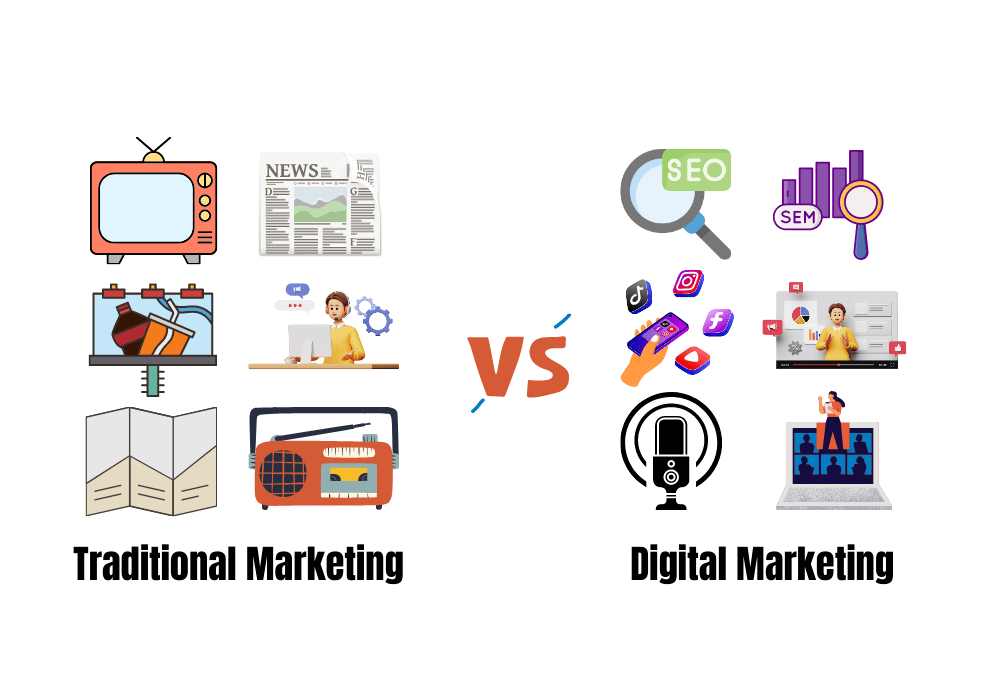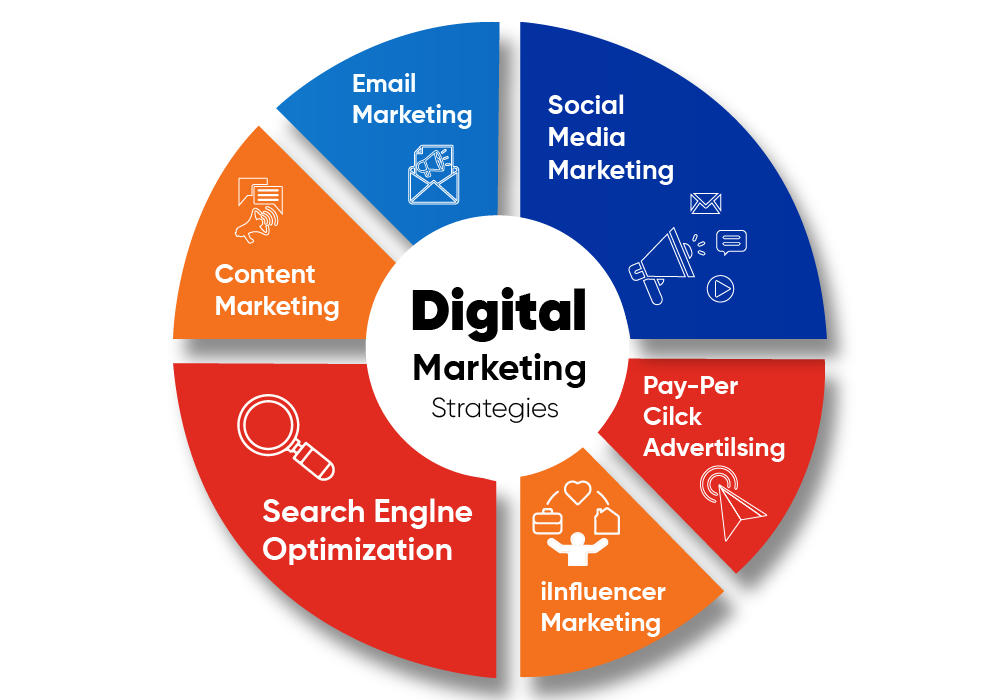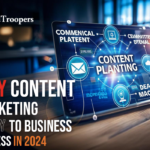Is Traditional Marketing Still Relevant in the Digital Age
Marketing plays a crucial role in the success of any business, as it helps brands reach and engage with their target audiences, boost sales, and foster customer loyalty. Over the years, marketing has evolved significantly, with businesses transitioning from traditional methods to digital solutions. This shift has sparked an ongoing debate: Is traditional marketing still relevant, or has digital marketing taken over?
While traditional marketing remains valuable in certain situations, digital marketing has proven to be the more effective and efficient choice for many businesses today. In this blog, we will compare traditional and digital marketing, highlighting why digital marketing is the clear winner in the modern business world.

What is Traditional Marketing?
Traditional marketing refers to the conventional methods of promoting a product or service that have been in use for many years. This includes tactics such as television and radio commercials, print advertisements (in newspapers and magazines), billboards, flyers, and direct mail. These methods have been tried and tested for decades and are still used by some businesses today.
The advantages of traditional marketing include:
- Mass Reach: Traditional marketing channels like TV, radio, and print can reach a large audience, making them suitable for brands aiming for widespread exposure.
- Tangible Materials: Print ads, brochures, and postcards allow customers to interact with physical materials, which some consumers find appealing.
- Trust Factor: Many people still trust traditional forms of advertising, associating them with established brands and reputations.
However, traditional marketing also has its drawbacks, such as high costs, limited ability to measure effectiveness, and difficulty targeting specific audiences. These limitations have led many businesses to look for alternatives, with digital marketing offering a solution.
What is Digital Marketing?
Digital marketing refers to the use of online platforms, tools, and channels to promote products or services. This includes a wide range of activities, such as social media marketing, Search Engine Optimization (SEO), email marketing, content marketing, and Pay-Per-Click (PPC) advertising. With the rise of the internet and technology, digital marketing has become essential for businesses of all sizes.
Key aspects of digital marketing include:
- Social Media Marketing: Leveraging platforms like Facebook, Instagram, Twitter, and LinkedIn to create brand awareness and engage with customers.
- Search Engine Optimization (SEO): Improving a website’s visibility in search engine results to drive organic traffic and increase leads.
- Email Marketing: Sending targeted, personalized messages to customers to inform them of promotions, updates, or new products.
- Content Marketing: Creating valuable content, such as blog posts, videos, and infographics, to educate and engage your audience.
- PPC Advertising: Running paid ads on search engines or social media platforms to drive traffic and increase conversions.
One of the main benefits of digital marketing is the ability to track results in real time. Businesses can measure Key Performance Indicators (KPIs), analyze data, and adjust campaigns for better outcomes. Furthermore, digital marketing offers more precise targeting capabilities, allowing brands to reach specific segments based on demographics, interests, and online behavior.

Why Digital Marketing is Winning
There are several reasons why digital marketing has emerged as the dominant force in modern business:
1. Cost Efficiency
Traditional marketing can be expensive, especially when it comes to TV ads, radio spots, or large-scale print campaigns. On the other hand, digital marketing offers more budget-friendly options. With platforms like Google Ads and Facebook Ads, businesses can set flexible budgets and only pay when users engage with the ad (such as through clicks or impressions).
Moreover, digital marketing allows businesses to scale their efforts according to their financial resources. Small businesses with modest budgets can still reach their target audience, which would be difficult with traditional methods.
2. Precise Targeting
One of the biggest advantages of digital marketing over traditional marketing is its ability to target specific audiences. Using digital tools, businesses can target potential customers based on demographics, location, interests, and behavior. For example, Facebook allows businesses to run ads specifically targeting users based on their age, gender, location, and even their shopping habits.
Traditional marketing, by contrast, relies on broad reach and cannot pinpoint exact customer segments. This makes digital marketing a more effective way to get the right message to the right people at the right time.
3. Real-Time Analytics
Unlike traditional marketing, which often requires a significant amount of time to assess effectiveness, digital marketing offers real-time insights. With tools like Google Analytics, businesses can monitor the performance of their campaigns and make immediate adjustments. This allows for continuous optimization of strategies to improve results.
Traditional marketing methods, such as TV ads or print campaigns, make it difficult to track success accurately, making it challenging to understand which aspects of the campaign are working and which aren’t.
4. Greater Engagement Opportunities
Digital marketing offers many opportunities for interactive engagement with customers. Through social media platforms, businesses can communicate directly with consumers, answer questions, and build relationships. Interactive features, such as polls, quizzes, and live videos, foster engagement and strengthen brand loyalty.
Traditional marketing methods typically lack this two-way interaction, with brands mainly speaking at their audience instead of engaging with them. Digital marketing encourages ongoing conversations that help businesses create meaningful connections with their customers.
5. Flexibility and Speed
Digital marketing campaigns can be launched and adjusted quickly. If a business wants to test a new ad or marketing strategy, it can do so in a matter of hours, and any changes can be implemented instantly. Traditional marketing, such as booking TV spots or printing new materials, takes more time and is often more rigid.
Additionally, digital marketing is not limited by geography. With the internet, businesses can reach a global audience, whereas traditional marketing is often constrained by regional boundaries and time zones.
6. Better ROI
Since digital marketing allows for precise targeting, budget control, and real-time optimization, it tends to deliver a higher Return On Investment (ROI) than traditional marketing. With the ability to measure results accurately, businesses can allocate their budgets to the most effective campaigns, ensuring that every dollar spent is working toward achieving business goals.
Summary
While traditional marketing is not obsolete and still plays a role in certain industries and for specific types of campaigns, the advantages of digital marketing are undeniable. Its cost-effectiveness, precision, engagement opportunities, and ability to provide real-time insights have made it the go-to choice for businesses seeking to thrive in the modern, digital-first world.
Digital marketing continues to evolve, offering new tools and strategies for businesses to connect with their target audiences. As more people turn to online platforms, it’s clear that digital marketing is the future, and businesses that embrace it will be well-positioned to succeed in an increasingly competitive marketplace.





